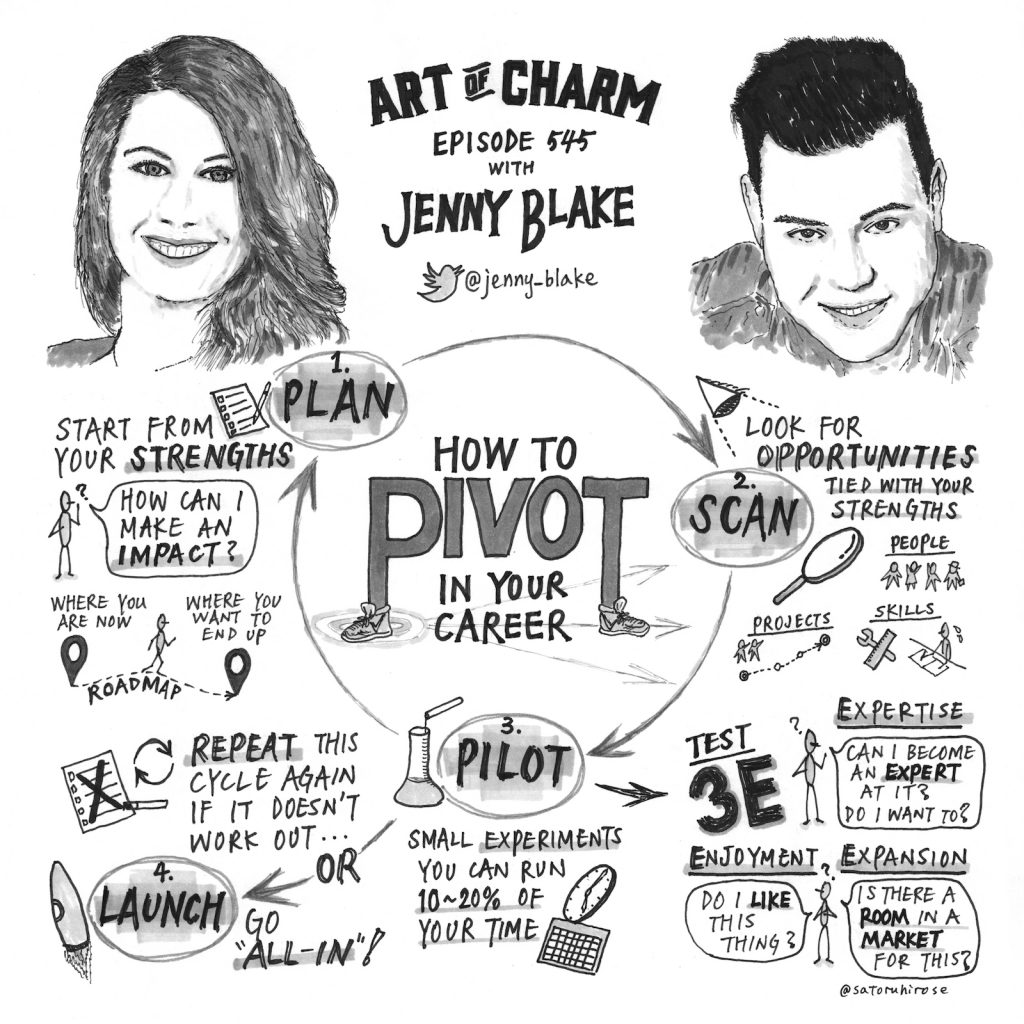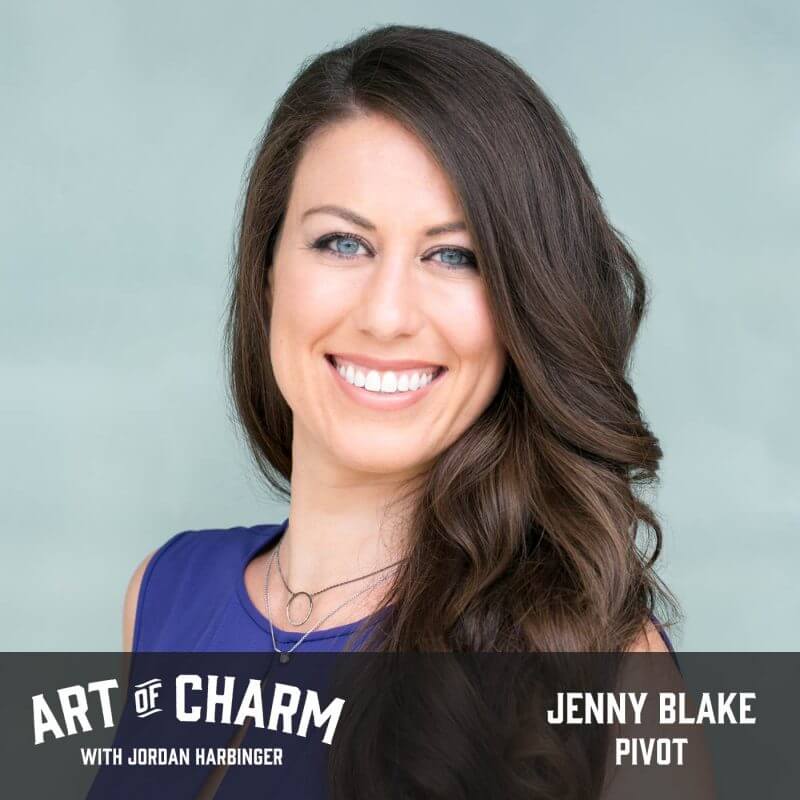Jenny Blake (@Jenny_Blake) is the author of Pivot: The Only Move That Matters Is Your Next One. She joins the show to help us better deal with the only real constant in life: change.
The Cheat Sheet:
- How to make yourself more agile in your career.
- How to make sure you’re not afraid to make a move forward instead of staying stagnant — or worse: going for Plan B.
- How to actually pivot, and why it’s not as drastic or dramatic as you might think.
- Why if you don’t prepare for a pivot, you might be pivoted.
- How to know when it’s time to quit your day job and go all-in on your side gig or make the leap to a different job or career entirely.
- And so much more…
[aoc-subscribe]
Career changes seem to threaten our most fundamental needs on Maslow’s hierarchy — food, clothing and shelter — so there is understandably fear surrounding them. However, people need to proactively pivot (within their current role or business or outside of it) or they will get pivoted.
Jenny Blake, author of Pivot: The Only Move That Matters Is Your Next One, has a motto: if change is the only constant, let’s get better at it. She joins us for today’s episode of The Art of Charm to help us get started. Enjoy!

More About This Show
Jenny Blake, author of Pivot: The Only Move That Matters Is Your Next One, knows a thing or two about pivoting — in this context, making a drastic move from one career to another.
Leaving her cushy gig at Google to pursue something else was, she says, a bit like “breaking up with Brad Pitt.” People on the outside looking in thought she was making a big mistake — how could she hope to do better than Google? Why would she give up what so many consider a dream job?
And two years later, when her own business wasn’t doing as well as she had hoped and her options were fewer than before, she wasn’t just worried — she was angry.
“I hit another wall,” Jenny says. “Once again, I felt crazy. And once again I felt like I was losing my mind. This time I didn’t have a paycheck to fund that exploration. So as my bank account dwindled to zero, I had two weeks. I didn’t have January rent — this was January, 2014. I had to either move out of New York, or go get another job and fold my business. And that’s the moment that I [realized] I’d read over 400 personal development, business, and finance books — I was pissed! Why weren’t any of them working? I’d been reading this stuff for 15 years; why wasn’t it working? It was only when I started to really focus on what was working in my life and business…that’s when Pivot came to me.”
The idea wasn’t just to explore how people can be as agile as startups, but how we can shift methodically in a new direction by leveraging what we already have. As we’ve discussed on this show with countless guests over the years, there’s a shift in western work culture going on right now. We can either be prepared to make a pivot on our own terms when the desire or need arises, or we can pretend that such a pivot won’t ever be necessary — and then be surprised when one is forced upon us by circumstances beyond our control.
Would you rather stay at an office job with incredible benefits for a decade or two in hopes you’ll be able to retire from your earnings there — even if you don’t feel fulfilled by it? These jobs are becoming fewer and farther between, and there’s no guarantee the company to which you’ve hitched your hopes will even be around when it’s time to retire.
These days, people who are driven “don’t have FOMO (fear of missing out),” says Jenny. “We have FONT (fear of not trying).” What if you’ve settled for a job you don’t even like and the company folds or lays you off after 10 years of loyal service? How will you look back on the time you spent believing your job was secure?
You don’t have to be an entrepreneur to be prepared to pivot. You don’t have to be a chronic job-hopper to learn how to pivot. Jenny sees it as a mindset and a set of practices — and something anybody can learn. “If you’re constantly in a mindset of learning and experimenting,” says Jenny, “the pivot points aren’t so jarring.”
In Silicon Valley, where Jenny’s from, the term “pivot” has been traditionally used by startups for what happens when Plan A hasn’t worked out and Plan B is the safety net that has to be laid out to avoid complete disaster. But Jenny insists that for individuals, a pivot is actually Plan A — our first choice when what we’ve been settling for is no longer a viable option.
“We don’t have the luxury of the same job for 30 years anymore — at least with rare exception,” says Jenny. “So for us, pivoting is the new normal. It’s actually on us to be proactive about it and not see it as, ‘Oh, I’ve failed at something.’ Pivoting is actually a product of our success.”
So pivots should be seen as inevitable. But will you pivot or get pivoted?
Listen to this episode of The Art of Charm in its entirety to learn more about what makes people more agile in their careers; the importance of results, reputation, and platform; how we can make ourselves discoverable so we’re able to pair with the right clients and companies; what we can do to add value, contribute, and give to others before expecting to take; how personal projects can unexpectedly prove useful to others; why you should treat pivoting as a strategy rather than a bold action for the sake of it; how to size up the known variables that affect your intended direction to plan your course; how to scan for opportunities — connecting to people, developing new skills, and engaging in interesting projects; how to pilot your course by experimenting on a small scale; how to know when the time is right to make your move; and lots more.
THANKS, JENNY BLAKE!
Resources from this episode:
- Pivot: The Only Move That Matters Is Your Next One by Jenny Blake
- Life After College: The Complete Guide to Getting What You Want by Jenny Blake
- Jenny Blake at Twitter
- The Work Revolution: Freedom and Excellence for All by Julie Clow
You’ll also like:
- The Art of Charm Challenge (click here or text 38470 in the US)
- The Art of Charm Bootcamps
- Best of The Art of Charm Podcast
- The Art of Charm Toolbox
- The Art of Charm Toolbox for Women
On your phone? Click here to write us a well-deserved iTunes review and help us outrank the riffraff!
